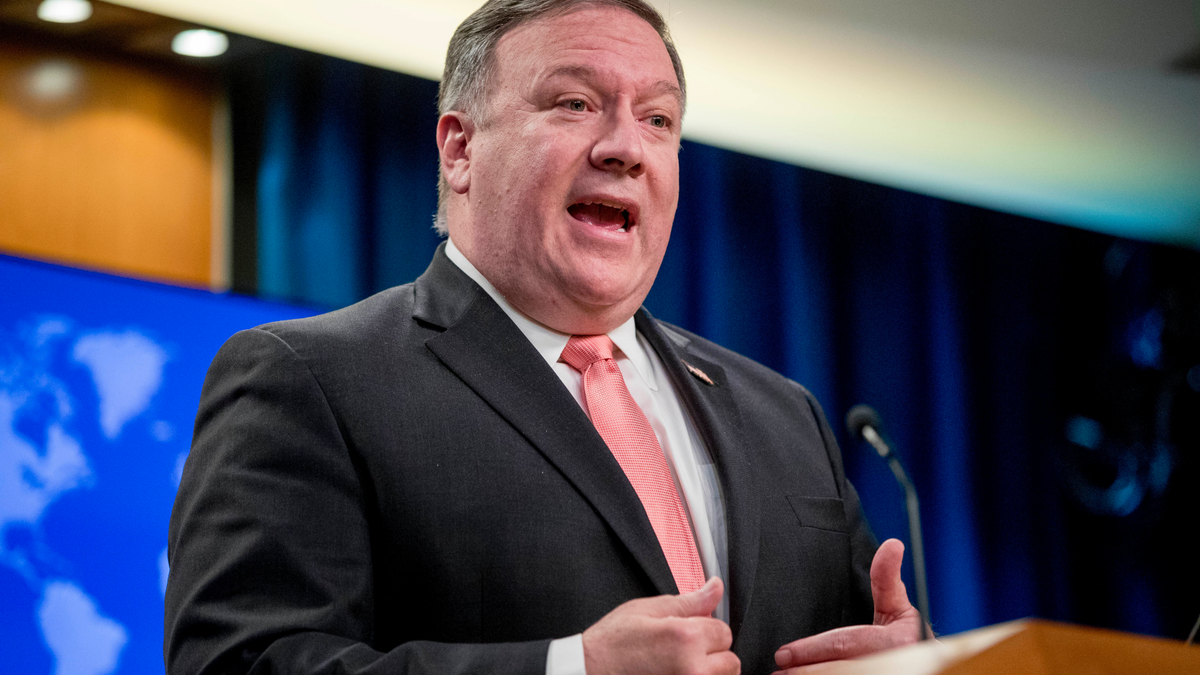
In this Oct. 23, 2018 photo, Secretary of State Mike Pompeo speaks to reporters at a news conference at the State Department in Washington. The Trump administration is calling for a halt to the civil war in Yemen, including airstrikes by the Arab-led coalition supported by the United States. Pompeo is urging all parties to support U.N. Special Envoy Martin Griffiths in what Pompeo says must be "substantive consultations" in November in a third country. (AP Photo/Andrew Harnik)
CAIRO – A leading Yemeni rebel figure on Thursday described the Trump administration's calls for a cease-fire in his country as "positive" but urged more international action to stop deadly airstrikes by the rebels' adversary, a U.S.-backed Saudi-led coalition.
The comments by Mohamed Ali al-Houthi on al-Masirah TV network, which backs Yemen's Shiite rebels known as Houthis, followed U.S. demands for a truce and the launch of U.N.-led political talks to end the Saudi-Iran proxy war, now in its fourth year.
According to al-Houthi, the chief of the rebel Supreme Revolutionary Committee, those urging a cease-fire should "translate their desire to bring peace in Yemen into action, stop the bombing of Yemenis immediately and lift the siege on Yemen."
On Tuesday, U.S. Secretary of State Mike Pompeo announced what amounted to a major shift in the U.S. stance on the conflict, calling for a "cessation of hostilities." U.S. Defense Secretary Jim Mattis said the truce should happen within 30 days and lead to U.N.-led political talks.
The renewed diplomatic drive reflected a convergence of political pressures on Saudi Arabia stemming from international outrage over the slaying of a U.S.-based Saudi journalist, Jamal Khashoggi, and the humanitarian crisis that has pushed Yemen to the brink of famine.
The Saudi-led coalition has been stepping up an assault on the Red Sea port of Hodeida, the entry point for 70 percent of food imports and international aid to Yemen, the Arab world's poorest country.
The coalition has waged war on the Houthis since March 2015 in efforts to bring back to power Yemen's internationally recognized government, which was toppled by the rebels after they seized the capital, Sanaa, in 2014. The Saudi-led coalition sees the rebels' ascendance as interference by Shiite powerhouse Iran, the kingdom's key rival.
The Houthis, who control most of northern Yemen, accuse the coalition of killing thousands of Yemeni civilians in a relentless air campaign and of choking Hodeida.
In his remarks to the rebel TV, al-Houthi demanded the formation of international commissions of inquiry to investigate "crimes" of what the rebels describe as "U.S.-Saudi aggression."
"It is necessary to stopping the war and the acts aggression, first of all, from the aggressor states which are supported by the United States of America," said Sultan al-Samaey, a member of the Houthi's Political Council.
Bu the U.S. proposal was greeted with skepticism in the Houthi-controlled Sanaa.
Al-Samaey said that while the war needed to be brought to an end, the rebels would only support "a peace which will preserve our independence."
"This is simply a solution that will only plant land mines in the future of this region," said Ayoub al-Tamimi, a Sanaa resident and political activist. "There is no solution that can come from (President Donald) Trump or the Democrats, only booby traps."
The International Committee for the Red Cross said Wednesday that its team in Hodeida this week found dreadful living conditions for thousands of displaced families "who own only the clothes they wear and survive on a little rice or a thin mix of flour and water, if they find any food to eat at all."
"We know this is out of humanitarian hands, we know this is a political issue," Avril Patterson, the ICRC's health coordinator in Yemen said in an interview with the BBC on Thursday. "We need cessation of hostilities so that the country can rebuild."
The conflict in Yemen has so far killed an estimated 10,000 people and also left around two-thirds of Yemen's population of 27 million relying on aid, with more than 8 million at risk of starvation.








































